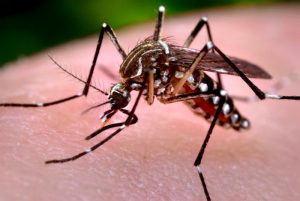In a follow-up on the Thailand chikungunya outbreak, particularly affecting the southern provinces, Thai health officials now report 3141 cases as of Apr. 23 from 21 provinces.

No deaths have been reported.
The good news is, it appears that the number of cases reported by week is declining.
Chikungunya Virus (CHIKV) is an arbovirus of the alphavirus genus (Togaviridae family) transmitted by the bite of infected Aedes mosquitoes. The word, Chikungunya, translates to “that which bends up”, based on the stooped position of patients during the rheumatic symptoms of the disease.
In humans bitten by an infected mosquito, the disease symptoms usually appear after an incubation period of three to seven days (range 1- 12 days).
The Perfect Predator: A Scientist’s Race to Save Her Husband from a Deadly Superbug: A Memoir
CHIKV can cause acute, sub-acute, and chronic disease.
In acute disease, symptoms develop abruptly and include high fever, headache, myalgia and arthralgia (predominantly in limbs and large joints). The appearance of a maculopapular rash is also frequent. Severe forms of the disease are rare. Symptoms usually resolve in 7-10 days, although arthralgia and joint stiffness may persist intermittently for several months.
The disease shares some clinical signs with dengue and Zika, and can be misdiagnosed in areas where they are common. As there is no cure, treatment is focused on relieving the symptoms.
- Virginia declares a statewide outbreak of hepatitis A
- Malaria: Annual observance passes with barely a word about Venezuela
- Alaska reports rat lungworm case in traveler to Hawaii, 1st case reported
- Polio in Afghanistan and Pakistan, Nigeria closes in on polio-free status
- Bacteriophages and ‘The Perfect Predator’
- UCLA: 127 students and faculty quarantined due to measles case
- Malaria: Global funding short of WHO target


